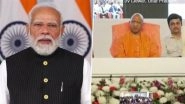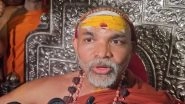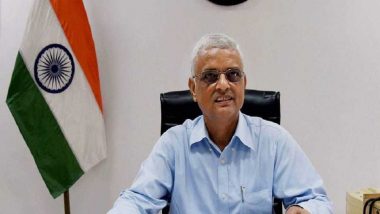New Delhi, October 7: With the pronouncement of assembly elections dates in Madhya Pradesh, Chhattisgarh, Rajasthan, Telangana and Mizoram, the Model Code of Conduct (MCC) comes into force in the five poll-bound states. With the MCC being imposed, the Election Commission is authorised to regulate the activities of the government, apart from taking punitive action against political parties and individual aspirants.
The aim of imposing polling code is to ensure a level-playing field, with the party ruling the outgoing government being prevented from using the state machinery for electioneering purpose. Check Full Schedule and Dates of Upcoming Assembly Polls.
The Election Commission on Sunday announced that it would be relying on technological applications as well to monitor the imposition of MCC. The EC has developed C-VIGIL android mobile phone application to enable people to report code violations. Election Commission to Use Tech for Nailing Model Code of Conduct Violations, Ensure Smooth Voting.
What is the Model Code of Conduct (Aachar Sanhita)?
- The MCC is a set of guidelines issued by the Election Commission under Article 324 of the Constitution. The guidelines are intended to ensure a smooth and fair electioneering, with no groups, including the ruling party, being allowed to take benefit of the state machinery.
- The Aachar Sanhita, as it is referred to in Hindi, is imposed immediately after the EC announced the polling dates. Since the schedule and dates were released on Saturday (October 6), the code of conduct came into immediate force from yesterday.
- The duration of MCC lasts till the counting of votes is completed. In this case, the code of conduct will remain imposed in the five states till December 11, when the Commission will announce the election results.
How the Political Parties & Individual Candidates are Affected?
- No party or candidate shall indulge in any activity which may aggravate
existing differences or create mutual hatred or cause tension between
different castes and communities, religious or linguistic.
- Criticism of other political parties , when made, shall be confined to their
policies and programme, past record and work. Parties and candidates
shall refrain from criticism of all aspects of private life, not connected with
the public activities of the leaders or workers of other parties. Criticism of
other parties or their workers based on unverified allegations or distortion
shall be avoided.
- There shall be no appeal to caste or communal feelings for securing votes.
mosques, churches, temples or other places of worship shall not be
used as forum for election propaganda.
- All parties and candidates shall avoid scrupulously all activities which are
“corrupt practices” and offences under the election law, such as bribing of
voters, intimidation of voters, impersonation of voters, canvassing within
100 metres of polling stations, holding public meetings during the period
of 48 hours ending with the hour fixed for the close of the poll, and the
transport and conveyance of voters to and from polling station.
- The right of every individual for peaceful and undisturbed home-life shall
be respected, however much the political parties or candidates may resent
his political opinions or activities. Organising demonstrations or picketing
before the houses of individuals by way of protesting against their opinions
or activities shall not be resorted to under any circumstances.
- No Political party or candidate shall permit its or his followers to make use
of any individual’s land, building, compound wall etc., without his
permission , for erecting flag-staffs, suspending banners, pasting notices,
writing slogans etc.
- Political parties and candidates shall ensure that their supporters do not
create obstructions in or break up meetings and processions organised by
other parties. Workers or sympathisers of one political party shall not
create disturbances at public meetings organised by another political party
by putting questions orally or in writing or by distributing leaflets of their
own party. Processions shall not be taken out by one party along places at
which meetings are being held by another party. Posters issued by one
party shall not be removed by workers of another party.
Here are the Guidelines Issued by the EC for the Ruling Party:
- The party in power whether at the Centre or in the State or States concerned , shall ensure that no cause is given for any complaint that it has used its official position for the purposes of its election campaign and in particular.
- The Ministers shall not combine their official visit with electioneering work and shall not also make use of official machinery or personnel during the electioneering work.
- Government transport including official air-crafts, vehicles, machinery and personnel shall not be used for furtherance of the interest of the party in power.
- Public places such as maidans etc., for holding election meetings ,and use of helipads for air-flights in connection with elections shall not be monopolised by itself. Other parties and candidates shall be allowed the use of such places and facilities on the same terms and conditions on which they are used by the party in power.
- Rest houses, dak bungalows or other Government accommodation shall not be monopolised by the party in power or its candidates and such accommodation shall be allowed to be used by other parties and candidates in a fair manner but no party or candidates shall use or be allowed to use such accommodation (including premises appertaining thereto) as a campaign office or for holding any public meeting for the purposes of election propaganda.
- Issue of advertisement at the cost of public exchequer in the newspapers and other media and the misuse of official mass media during the election period for partisan coverage of political news and publicity regarding achievements with a view to furthering the prospects of the party in power shall be scrupulously avoided.
- Ministers and other authorities shall not sanction grants/payments out of discretionary funds from the time elections are announced by the Commission.
- From the time elections are announced by the Commission, Ministers and other authorities shall not announce any financial grants in any form or promises thereof; or lay foundation stones etc. of projects or schemes of any kind; or make any promise of construction of roads, provision of drinking water facilities etc.; or make any ad-hoc appointments in Government, Public Undertakings etc. which may have the effect of influencing the voters in favour of the party in power.
Chief Election Commissioner Om Prakash Rawat on Saturday announced the schedule for the upcoming assembly elections 2018. The five states - Madhya Pradesh, Chhattisgarh, Rajasthan, Telangana and Mizoram - will go to polls between November 12 to December 7. Except for Chhattisgarh, single-phase voting would be held.
(The above story first appeared on LatestLY on Oct 07, 2018 07:27 PM IST. For more news and updates on politics, world, sports, entertainment and lifestyle, log on to our website latestly.com).












 Quickly
Quickly


